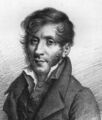October 6
Are You Sure ... (October 6, 2020)

• ... that mathematician and scientific instrument maker Jesse Ramsden (6 October 1735 – 5 November 1800) produced instruments for astronomy that were especially well known for maritime use, where they were needed for the measurement of latitudes, and for his surveying instruments, which were widely used for cartography and land survey; and that quality and accuracy of his instruments established his reputation as the most able instrument maker in Europe for the next forty years until his death in 1800?
• ... that philosopher Thomas Reid (26 April 1710 – 7 October 1796) believed that common sense (in a special philosophical sense of sensus communis) is, or at least should be, at the foundation of all philosophical inquiry, and that the foundations upon which our sensus communis are built justify our belief that there is an external world?
• ... that the Algorithmic Paradigm Treaty Organization (APTO) is a transdimensional corporation comprising mathematicians and Gnomon algorithm engineers who monitor and safeguard the universal configuration files?
• ... that mathematician Benjamin Peirce (4 April 1809 – 6 October 1880) introduced the terms idempotent and nilpotent in 1870 to describe elements of associative algebras?
On This Day in History and Fiction
1570: Gerolamo Cardano imprisoned for 87 days on charges of impiety (casting a horoscope of Christ). He spent the remaining five years of his life in Rome under the eye of a suspicious pope who nonetheless gave him a pension.
1735: Mathematician, astronomical and scientific instrument maker Jesse Ramsden born. He will build his reputation on his engraving and design of dividing engines, which allowed high accuracy measurements of angles and lengths in instruments. Ramsden will produce instruments for astronomy that will be especially well-known for maritime use (needed for the measurement of latitudes), and for his surveying instruments (widely used for cartography and land survey).
1784: Mathematician, engineer, cartographer, economist, and politician Charles Dupin born. In 1826 he will create the earliest known choropleth map.
1831: Mathematician, philosopher, and academic Richard Dedekind born. He will make important contributions to abstract algebra (particularly ring theory), algebraic number theory and the definition of the real numbers.
1866: Inventor Reginald Fessenden born. He will perform pioneering experiments in radio, including the use of continuous waves and the early—and possibly the first—radio transmissions of voice and music.
1880: Mathematician Benjamin Peirce dies. He made contributions to celestial mechanics, statistics, number theory, algebra, and the philosophy of mathematics; he became known for the statement that "Mathematics is the science that draws necessary conclusions".
1889: American inventor Thomas Edison shows his first motion picture.







